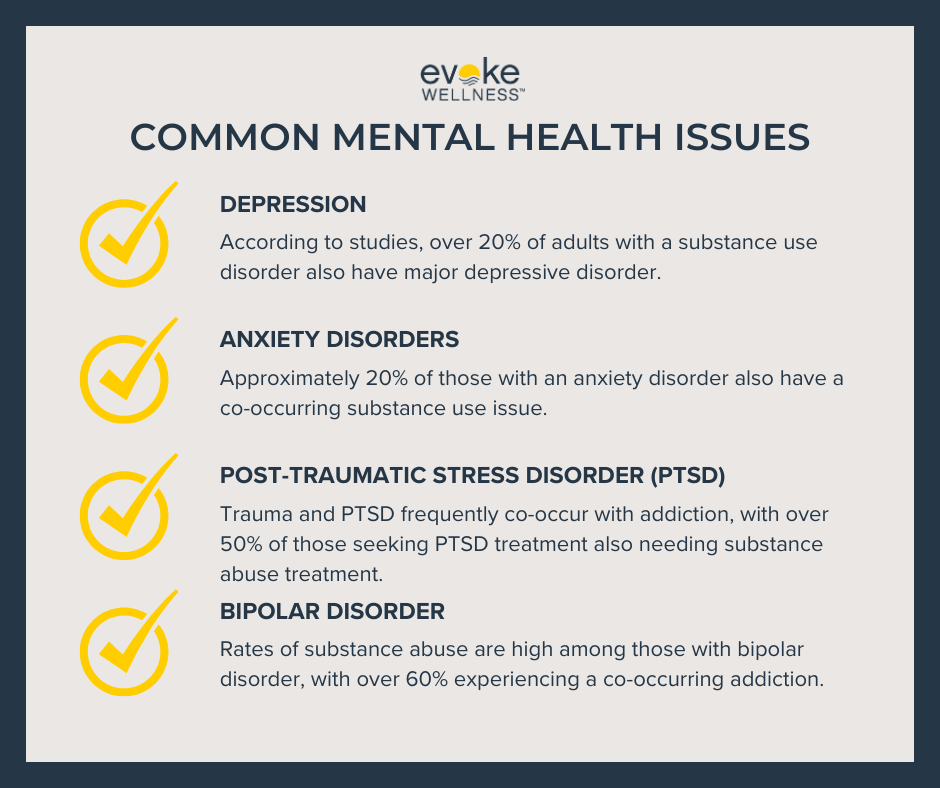You’re not alone in facing addiction and mental health challenges. According to recent studies, over 20 million Americans struggle with substance use disorders, while 1 in 5 adults experience mental illness annually. The stigma surrounding these issues often prevents individuals from seeking help, but it’s crucial to break down these barriers. At Evoke Wellness at Waltham, we understand the complex relationship between addiction and mental health.
By addressing both addiction and mental health simultaneously, you can achieve lasting recovery and improved overall well-being. Let’s explore how to overcome obstacles and encourage openness about these interconnected struggles.
Together, let’s embrace the journey to recovery and the promise of a new beginning. Call us at (833) 287-7223 today or reach out online.
The Intersection of Addiction and Mental Health
Substance Abuse and Mental Health Disorders
- Substance use disorders (SUDs) and mental health conditions frequently co-occur, with a complex interplay between the two. This dual diagnosis can exacerbate symptoms, complicate treatment, and increase the risk of relapse if not addressed comprehensively.
- Common mental health issues that accompany addiction include depression, anxiety disorders, PTSD, and other mood or trauma-related conditions. Self-medication with substances is an attempt to cope but ultimately worsens both the addiction and mental health struggles.
Integrated Treatment Approaches
- Effectively treating co-occurring disorders requires specialized programs that integrate mental health care and addiction treatment. This holistic approach utilizes a range of therapeutic interventions, such as cognitive-behavioral therapy (CBT), dialectical behavior therapy (DBT), trauma-focused therapies, and medication management.
- Tailored treatment plans are essential, as each individual’s circumstances and needs are unique. Programs should address the root causes, provide coping strategies, and support long-term recovery from both substance abuse and mental illness.
Ongoing Support and Community Resources
- Recovery from co-occurring disorders is an ongoing journey that requires extensive support. Family involvement, peer support groups, sober living environments, and community resources play a vital role in maintaining treatment adherence and preventing relapse.
- Building a strong support network and healthy coping mechanisms are crucial for individuals navigating the intersection of addiction and mental health. With comprehensive care, empathy, and perseverance, it is possible to overcome these challenges and achieve lasting wellness.
How Addiction Affects Mental Health
A Vicious Cycle
Addiction and mental health disorders often exist in a vicious cycle, each fueling and exacerbating the other. According to research on Evoke Wellness, drug and alcohol abuse can lead to various mental health issues like anxiety, depression, personality disorders, and even psychosis. Conversely, individuals may turn to substances as a way to self-medicate undiagnosed mental health conditions, creating a dangerous feedback loop.
Psychological Toll
The psychological toll of addiction can be severe. Studies show that long-term substance abuse is linked to mental health problems such as depression, anxiety disorders, distorted reality, and difficulty thinking clearly. Even short-term drug use can trigger hallucinations, paranoia, and acute confusion.
Moreover, the mental anguish of withdrawal symptoms like anxiety, insomnia, and intense cravings can further exacerbate existing psychological issues, making recovery an uphill battle.
Seeking Comprehensive Treatment
Breaking this cycle requires comprehensive treatment that addresses both addiction and co-occurring mental health disorders. Evidence-based therapies like cognitive-behavioral therapy (CBT) and dialectical behavior therapy (DBT) can help individuals develop coping mechanisms, regulate emotions, and restructure thought patterns.
According to Evoke Wellness, their personalized treatment programs offer a range of therapy options, specialized substance abuse and mental health programs, and compassionate support to guide individuals on their journey to recovery and improved overall well-being.
Addiction as a Mental Health Challenge
The Complex Nature
Addiction is a chronic mental health disorder characterized by compulsive substance use or engagement in harmful behaviors despite negative consequences. What makes addiction so challenging is its complexity – it affects the brain’s reward system, altering neural pathways and impairing decision-making abilities. According to the National Institute on Drug Abuse, addiction is considered a mental illness due to its impact on brain function and behavior.
Co-occurring Disorders
Addiction often co-occurs with other mental health conditions, such as depression, anxiety, or post-traumatic stress disorder (PTSD). A study by the Substance Abuse and Mental Health Services Administration (SAMHSA) found that in 2020, 17 million adults in the U.S. had a co-occurring substance use disorder and mental illness. This dual diagnosis complicates treatment, as both conditions must be addressed simultaneously for effective recovery.
Comprehensive Treatment
Treating addiction as a mental health challenge requires a comprehensive approach that addresses the underlying psychological, social, and biological factors. This may involve a combination of:
- Psychotherapy (e.g., cognitive-behavioral therapy, motivational interviewing)
- Medication-assisted treatment for substance use disorders
- Support groups and peer-based recovery programs
- Lifestyle changes (exercise, nutrition, stress management)
- Addressing co-occurring mental health conditions
By recognizing addiction as a mental health issue and providing integrated, evidence-based treatment, individuals can develop coping strategies, rebuild healthy neural pathways, and achieve long-term recovery.
The Link Between Addiction and Depression
Addiction’s Impact on Mental Health
Depression and substance abuse disorders often co-occur. According to a study by the Substance Abuse and Mental Health Services Administration (SAMHSA), individuals with a substance use disorder were nearly twice as likely to have a co-occurring mental illness like depression. This powerful link highlights the need for integrated treatment approaches.
A Vicious Cycle
Substance abuse and depression can exacerbate each other in a vicious cycle. Individuals may turn to drugs or alcohol to self-medicate the symptoms of depression, while substance abuse itself can trigger or worsen depressive episodes. As reported by the National Institute on Drug Abuse, this cyclical pattern makes treating co-occurring disorders incredibly challenging.
Holistic Healing
Effective treatment requires addressing both addiction and mental health simultaneously through a holistic approach. At Evoke Wellness at Waltham, we combine evidence-based therapies like cognitive-behavioral therapy (CBT) and dialectical behavior therapy (DBT) with trauma counseling, medication-assisted treatments, and holistic therapies. Our comprehensive programs aim to heal the mind, body, and spirit, empowering individuals to break free from the grip of addiction and depression.
Co-Occurring Mental Health Conditions
Integrated Treatment Approach
Treating co-occurring mental health and substance use disorders simultaneously through an integrated approach is crucial for lasting recovery. Evoke Wellness utilizes evidence-based therapies like cognitive-behavioral therapy (CBT), dialectical behavior therapy (DBT), and trauma-focused interventions like EMDR to address both conditions concurrently.
Their comprehensive programs incorporate medication-assisted treatment, individual and group counseling, family therapy, and holistic practices to promote overall well-being. Specialized tracks target specific mental health issues, providing personalized care tailored to each client’s unique needs.
Overcoming Barriers to Care
Breaking the stigma surrounding mental health and addiction is vital to encourage more individuals to seek professional help. According to studies, 1 in 5 U.S. adults live with a mental illness, and 20.4 million people aged 12 and older had a substance use disorder in 2019.
By practicing self-compassion, celebrating small victories, and seeking support from loved ones and professionals, individuals can overcome barriers like fear, shame, and negative beliefs. Open communication, empathy, and family integration therapy can create a healthier environment for recovery.
Integrated Treatment for Dual Diagnosis
Comprehensive Care Approach
Dual diagnosis, the co-occurrence of a mental health disorder and substance use disorder, requires a comprehensive, integrated approach to address both conditions simultaneously. Effective dual diagnosis treatment centers offer a continuum of evidence-based care, combining mental health therapies like cognitive-behavioral therapy (CBT) and dialectical behavior therapy (DBT) with substance abuse treatment programs incorporating medication-assisted treatment, counseling, and support groups.
Personalized, Trauma-Informed Care
Traumatic experiences can significantly impact mental health and increase the risk of substance abuse. As such, personalized, trauma-informed care is crucial in dual diagnosis treatment. Specialized therapies like EMDR (Eye Movement Desensitization and Reprocessing) are utilized to address the root causes and underlying trauma contributing to these co-occurring disorders.
Holistic Healing Modalities
In addition to evidence-based psychotherapies, holistic approaches such as mindfulness practices, experiential therapies, and wellness programs are incorporated into dual diagnosis treatment. These modalities equip individuals with healthy coping mechanisms and promote long-term recovery by addressing the mind, body, and spirit connection.
Continuum of Care
Effective dual diagnosis treatment programs offer a continuum of care, including day treatment, intensive outpatient, and aftercare planning. This comprehensive approach ensures a personalized treatment plan that supports individuals throughout their recovery journey, reinforcing coping strategies and emotional resilience to prevent relapse.
Conclusion
In conclusion, overcoming addiction and mental health struggles requires courage, support, and professional treatment. By breaking down barriers to openness, we can create a society where seeking help is normalized and celebrated.
Recent studies show that integrated treatment for addiction and mental health leads to better outcomes, with 60% of participants maintaining sobriety after one year. By encouraging open dialogue and connecting individuals to comprehensive care, we can foster healing and resilience. Together, we can build a future where no one faces these challenges alone.
Begin Your Journey with Evoke Wellness at Waltham
If you or a loved one is considering outpatient treatment, Evoke Wellness at Waltham invites you to contact us. Our compassionate team is ready to answer your questions, discuss your needs, and help you take the first steps toward recovery. At Evoke Wellness, you will find more than just a treatment program – you’ll discover a community dedicated to your wellness and success. Together, let’s embrace the journey to recovery and the promise of a new beginning. Call us at (833) 287-7223 today or reach out online.



